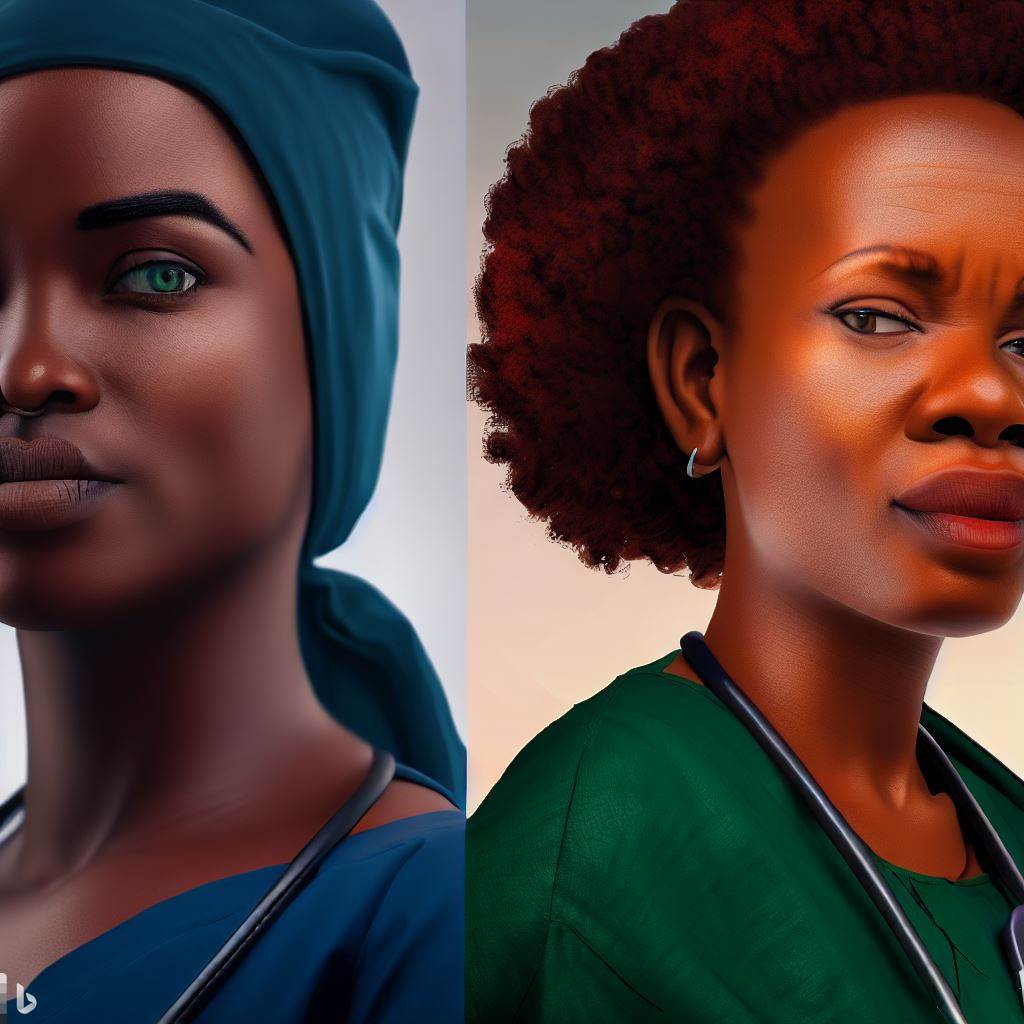Introduction
MRI Technologists play a critical role in the healthcare system of Nigeria. These professionals are responsible for operating the MRI machine, capturing detailed images of patients’ internal organs and tissues.
MRI Technologists in Nigeria are highly skilled individuals who specialize in using magnetic resonance imaging (MRI) technology to diagnose and monitor various medical conditions.
They work closely with physicians and radiologists to ensure accurate and high-quality images that aid in patient diagnosis and treatment.
Importance of Understanding Frequently Asked Questions about MRI Technologists
Understanding frequently asked questions about MRI Technologists is crucial for both healthcare professionals and patients in Nigeria.
This knowledge helps healthcare providers make informed decisions about the use of MRI technology and ensures that patients are well-informed and prepared for their MRI procedures.
Patients can gain a better understanding of the role of MRI Technologists, the procedure itself, and any potential risks or benefits.
This knowledge empowers patients to ask relevant questions and engage in shared decision-making with their healthcare providers.
Furthermore, healthcare professionals need to be aware of frequently asked questions about MRI Technologists to address any concerns or misconceptions of patients.
By providing accurate information and addressing common queries, healthcare professionals can ensure patients’ comfort and cooperation during the MRI procedure.
Overall, understanding frequently asked questions about MRI Technologists in Nigeria is essential for patients, healthcare professionals, and the healthcare system as a whole.
It promotes better communication, informed decision-making, and ultimately leads to improved patient outcomes.
What is an MRI Technologist?
MRI Technologists are highly skilled medical professionals who operate MRI machines and perform diagnostic imaging procedures using magnetic resonance technology.
Definition and role of an MRI Technologist
An MRI Technologist is a healthcare professional trained in the field of magnetic resonance imaging (MRI).
They play a crucial role in the diagnosis and treatment of various medical conditions by creating detailed images of the body’s internal structures.
These images help doctors to identify and evaluate diseases or abnormalities within the body.
MRI Technologists work in hospitals, clinics, and imaging centers, collaborating with radiologists and other healthcare professionals.
Responsibilities and duties of an MRI Technologist in Nigeria
- Operating MRI machines: MRI Technologists are responsible for operating and maintaining MRI scanners.
- Patient preparation: They ensure that patients are comfortably positioned and properly prepared for the examination.
- Setting imaging parameters: Technologists set the appropriate parameters on the MRI machine to obtain high-quality images.
- Monitoring safety: They follow strict safety protocols to protect the patient and themselves from potential hazards related to magnetic fields.
- Image interpretation: While MRI Technologists do not provide an official diagnosis, they can identify image artifacts and notify radiologists of any abnormal findings.
- Documentation and record-keeping: Technologists maintain accurate records of patient information, examinations performed, and any pertinent observations.
- Equipment maintenance: They perform routine maintenance and troubleshoot technical issues to ensure proper functioning of the MRI machine.
- Quality control: MRI Technologists participate in quality control programs to ensure the accuracy and reliability of imaging results.
- Patient care: They provide support, reassurance, and clear communication to patients throughout the imaging process.
- Continuous learning: MRI Technologists stay updated with advancements in MRI technology and seek opportunities for professional development.
Benefits of choosing a career as an MRI Technologist in Nigeria
- Job stability: With the increasing demand for diagnostic imaging services, MRI Technologists enjoy a stable and secure career path.
- Competitive salary: MRI Technologists receive competitive salaries, reflecting their specialized skills and training.
- Professional growth opportunities: Technologists can advance in their careers by obtaining advanced certifications or specializing in specific areas of MRI technology.
- Contribution to patient care: MRI Technologists have a direct impact on patient care by assisting in accurate diagnoses and effective treatment plans.
- Collaboration with healthcare professionals: They work closely with radiologists, physicians, and other healthcare professionals, fostering a collaborative healthcare approach.
In general, MRI Technologists in Nigeria play a vital role in the field of diagnostic imaging. Their responsibilities include operating MRI machines, ensuring patient safety, obtaining high-quality images, and providing support to patients.
Choosing a career as an MRI Technologist can lead to job stability, competitive salaries, and opportunities for professional growth while contributing to patient care and collaborating with other healthcare professionals.
Read: Becoming a Physical Therapist: Steps in Nigeria
Educational Requirements
When considering a career as an MRI Technologist in Nigeria, it is important to understand the educational requirements and certifications needed for this profession.
Required Education and Certification
To become an MRI Technologist in Nigeria, individuals must first obtain a Bachelor’s degree in Radiologic Technology or a related field.
Once the Bachelor’s degree is obtained, aspiring MRI Technologists must then complete additional specialized training in MRI technology.
This specialized training can be obtained through postgraduate programs or certification courses offered by accredited institutions.
After completing the required training, individuals must obtain certification from recognized professional bodies such as the Radiographers Registration Board of Nigeria (RRBN) and the Nigerian Institute of Radiographers (NIR).
These certifications not only validate the expertise of the MRI Technologist but also ensure compliance with professional standards and ethical practices.
The Importance of Ongoing Education and Professional Development
Continuous learning and professional development play a crucial role in the career of an MRI Technologist in Nigeria.
Advancements in Technology
As technology rapidly evolves, staying updated with the latest advancements is essential for MRI Technologists to effectively operate and maintain the equipment.
Ongoing education helps MRI Technologists develop the skills necessary to handle new imaging techniques and software.
Ensuring Quality Care
By engaging in ongoing education, MRI Technologists can provide quality care to patients by staying abreast of the latest diagnostic and imaging protocols.
MRI Technologists engage in continuous professional development to become well-versed in best practices, thereby enhancing the accuracy of diagnoses and improving patient outcomes.
Career Advancement
Ongoing education and professional development open doors to career advancement opportunities for MRI Technologists in Nigeria.
By acquiring additional certifications, such as Magnetic Resonance Imaging (MRI) advanced certificates, technologists can specialize in specific areas and take on supervisory or managerial roles.
Continuing Professional Development (CPD)
Participation in CPD programs ensures that MRI Technologists engage in lifelong learning and stay updated with the evolving standards and regulations in the field.
CPD activities can include attending conferences, workshops, webinars, and reading scientific articles.
To become an MRI Technologist in Nigeria, a Bachelor’s degree in Radiologic Technology and specialized training in MRI technology are necessary.
Obtaining certification from recognized professional bodies is also crucial to validate expertise and maintain professional standards.
Ongoing education and professional development are equally important for MRI Technologists to stay updated with advancements, provide quality care, and advance their careers.
By embracing continuous learning and engaging in professional development, MRI Technologists can excel in their field while contributing to the well-being of patients and the healthcare system as a whole.
Read: Challenges and Opportunities for Physical Therapists in Nigeria

Job Outlook and Opportunities
Here are the key points to consider regarding the demand for MRI Technologists in Nigeria:
- Increasing demand: The need for MRI Technologists is on the rise in Nigeria.
- Medical advancements: The growing complexity of medical conditions requires accurate diagnostic imaging.
- Specialized expertise: MRI Technologists possess the necessary skills and knowledge for high-quality imaging.
- Limited supply: The number of MRI Technologists in Nigeria is relatively low compared to the demand.
- Job security: The scarcity of professionals in the field ensures a stable and secure job market.
Career growth and advancement opportunities
- Specialization options: MRI Technologists can specialize in areas such as neuroimaging or musculoskeletal imaging.
- Advanced certifications: Pursuing advanced certifications can lead to better job prospects and higher salaries.
- Management roles: Experienced MRI Technologists can advance to managerial positions in imaging centers.
- Education and research: Some MRI Technologists choose to teach or conduct research in universities or medical institutions.
- Continuing education: Staying updated with the latest advancements and technologies can open doors to better opportunities.
The burgeoning demand for MRI Technologists in Nigeria presents a prudent career path. The field promises substantial growth due to the dearth of specialized MRI professionals.
Increasing diagnostic imaging needs and complex medical conditions further amplify this demand.
The profession offers tailored avenues for advancement. Specializing in specific imaging niches can bolster demand and job opportunities.
Advanced certifications and ongoing education fuel career prospects, highlighting advanced skills and elevating income and job stability.
Experienced MRI Technologists can ascend to managerial roles, overseeing operations and staff in imaging centers. Some choose academia or research, imparting knowledge and fostering field evolution.
In summary, Nigeria’s MRI Technologist demand surge offers a bright job panorama. Career prospects encompass specialization, certifications, management, and education, ensuring a rewarding and enriching journey.
Read: Public Health Impact of Respiratory Therapists in Nigeria
FAQs about MRI Technologists in Nigeria
What are the skills you require to become an MRI Technologist in Nigeria?
To become an MRI Technologist in Nigeria, you need to possess essential technical skills related to operating MRI machines, a good communication ability to interact with patients, and strong interpersonal skills to collaborate with the healthcare team.
How do I become a certified MRI Technologist in Nigeria?
Becoming a certified MRI Technologist in Nigeria requires completing a recognized educational program in radiography, gaining practical experience through clinical rotations, and passing the certification exam administered by the Radiographers Registration Board of Nigeria (RRBN).
What is the average salary of an MRI Technologist in Nigeria?
The average salary of an MRI Technologist in Nigeria ranges between N500,000 to N1,500,000 depending on factors such as experience, location, and the healthcare facility.
What is the working environment like for MRI Technologists in Nigeria?
MRI Technologists in Nigeria work in various settings, including hospitals, diagnostic centers, and medical clinics.
The working conditions typically involve operating the MRI equipment, collaborating with radiologists and other healthcare professionals, and ensuring patient safety throughout the imaging process.
Are there any risks involved in the MRI Technologist profession?
While the MRI Technologist profession is generally safe, there are potential risks involved.
Technologists must follow strict safety protocols to protect themselves and patients from the strong magnetic fields and radiofrequency radiation emitted by the MRI machines.
Proper screening and patient assessment are crucial to avoid adverse events.
Read: The Path to Becoming a Surgeon in Nigeria
Are there any specialized areas within MRI technology in Nigeria?
In Nigeria’s MRI technology field, specialized domains like cardiovascular, musculoskeletal, and neuroimaging offer career growth.
Proficiency in technical, communication, and interpersonal skills is crucial for success. Certification mandates completing recognized radiography education, followed by hands-on clinical experience and a certification exam.
Earnings range from N500,000 to N1,500,000 yearly, shaped by experience and setting. MRI Technologists contribute in hospitals, diagnostic centers, and clinics, operating machines and collaborating with radiologists.
Vigilance toward potential hazards like magnetic fields is vital. Specializing further enhances prospects. In summation, adept MRI Technologists in Nigeria require skill mastery, safety consciousness, and specialized pursuits for a rewarding career journey.
Read: Overview: Physical Therapist Profession in Nigeria
Learn More: Career Opportunities for Counselors in Nigeria
Conclusion
MRI technologists play a crucial role in the healthcare industry in Nigeria. They are responsible for operating MRI machines and producing high-quality images for medical diagnoses.
Throughout this blog post, we have highlighted key points about MRI technologists, such as their training and certification requirements.
We have discussed the importance of their role in providing accurate and detailed images that assist doctors in making informed decisions about patient care.
MRI technologists are essential in detecting various medical conditions and diseases, including tumors, infections, and neurological disorders. Their expertise is vital in ensuring accurate diagnoses and appropriate treatment plans.
If you have an interest in healthcare and enjoy working with advanced technology, a career as an MRI technologist might be a suitable choice for you.
By pursuing this career path, you can contribute to improving patient outcomes and making a difference in the lives of individuals in need of medical attention.
Consider the rewarding career of an MRI technologist, where you can utilize your skills and knowledge to help save lives and provide valuable contributions to the healthcare sector in Nigeria.




